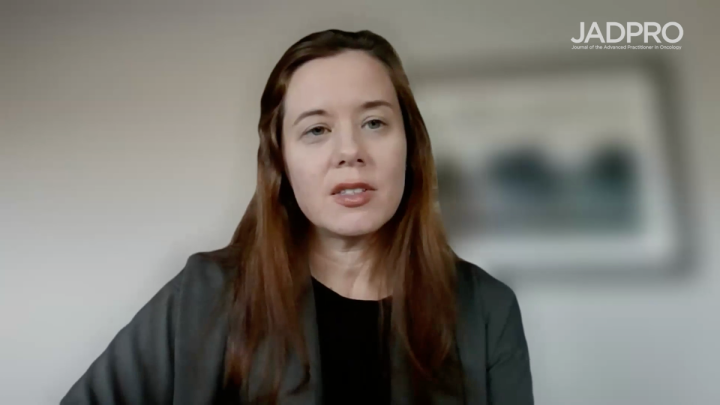Transcript
Desmoid tumors are not cancer, but they're locally aggressive soft tissue tumors, and we do treat them with agents that can potentially affect fertility in patients. The first consideration when it comes to a patient with a desmoid tumor is thinking about the location of their tumor. Is this location an area that's morbid, such as intra-abdominal or retroperitoneal? And is it in an area that could affect their fertility? Is it near their uterus? Is it near their ovaries? Could these areas be affected in surgery?
In regard to fertility preservation, it's really an issue that should be addressed as part of your consent process anytime you start treatment on a patient. And we know that desmoid tumors have several options for systemic therapy. Category 1 options per NCCN include nirogacestat and sorafenib. And then there's other options, other treatments that we use for treatment of desmoid tumors. These include methotrexate, imatinib, doxorubicin, pazopanib, Navelbine. These are all possible agents that we might use for the treatment of a desmoid tumor.
Two of those agents are tyrosine kinase inhibitors. And then there isn't a lot of data actually on the effects of fertility from tyrosine kinase inhibitors and the data that we do have is conflicting. Just as a brief reminder of how we approach fertility in cancer. As women, we're born with all the eggs we're ever going to have. We have about 300,000 eggs at the time of puberty, and there's a natural decline of those eggs over time. We found in the US that about the average age of menopause is 52, but we also found that it's not a specific age that menopause occurs. It usually happens when there's about a thousand eggs left in the ovary. So if we damage some of those eggs in a patient from the treatment that we're giving them, they may transition into menopause earlier than usual, and it could be 5 years, 10 years, 15 years earlier than that usual age of about 52.
In men, we know that if their spermatogonial stem cell is intact, that they can make sperm. If that stem cell remains healthy and undamaged from treatment that we give or chemotherapy drugs, they can continue to make sperm. So we need to think about options before we start treatment on a patient and how we might preserve their fertility if their fertility is at risk from treatment. In women, we can freeze eggs, we can freeze ovarian tissue, we can freeze embryos. And in men, we can freeze sperm and we can freeze testicular tissue. If a man's not able to sperm bank, we actually can take a biopsy of their testicle, send that tissue away and freeze that tissue, which contains the spermatogonial stem cell. Research is ongoing on how we might be able to grow sperm from that stem cell. So it's really cool science.
We know that we need to offer these different options to patients before they start treatment that might affect their fertility. In regard to nirogacestat, we don't have definitive data on how it affects fertility. The only way to definitively know if there is damage to a patient's fertility would be to start with baseline evaluation. Doing an evaluation on a patient prior to receiving nirogacestat, such as doing a baseline FSH, LH, estrogen, progesterone, and an AMH level, and then following that during their therapy and for several years after, as well as conception data, would be the only way to definitively know how it affects it.
But what we do know is that on the study that was done on nirogacestat, 27 out of 36 women were of childbearing potential when they received the drug. And 8.9 weeks in was the average time of when they started showing evidence of changes in their menstrual cycle, which could indicate some temporary dysfunction of their ovarian cycle. And then 20 out of 27 patients, that's 74%, actually had resolution of their menstrual cycle abnormalities while they were either on or off the drug. And 5 out of 27, which was about 18%, had potentially unresolved issues.
The data so far is reassuring, but it's not definitive. Adequate contraception is recommended while on nirogacestat for both men and women. And if fertility preservation is important to a patient, it really should be pursued prior to starting therapy. It's an individual informed decision, looking at the big picture for that patient.










